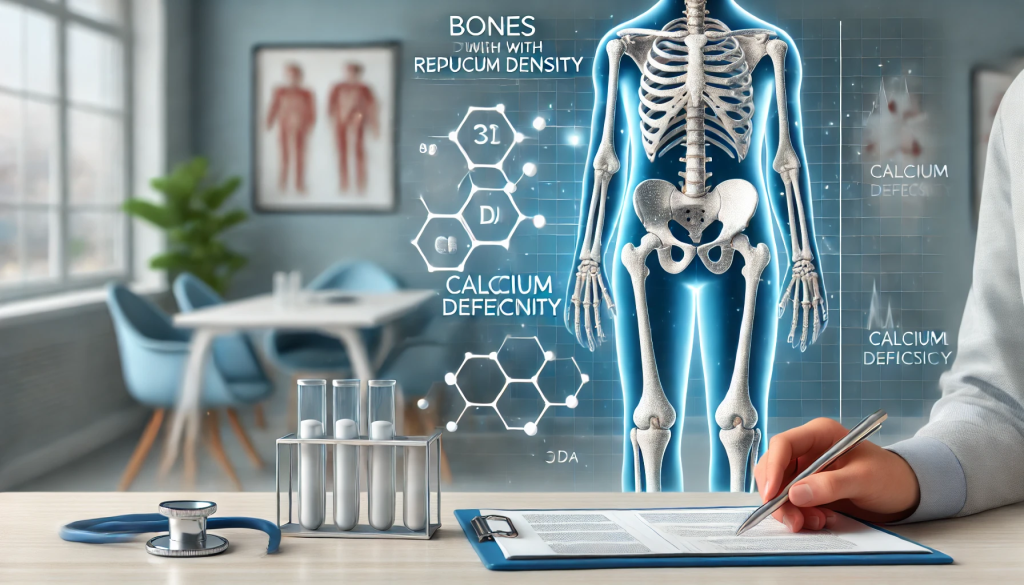Calcium deficiency, or hypocalcemia, is a condition where the body lacks this essential mineral. Calcium plays a crucial role in maintaining healthy bones, teeth, muscles, and the nervous system. A lack of calcium can cause various symptoms that are important to recognize early.
1. Bone and Joint Pain
- One of the early signs of calcium deficiency is bone pain, especially during movement.
- Joints may become stiff, leading to difficulty in movement.
2. Brittle Nails and Hair

- A lack of calcium weakens nail structure, making them brittle and prone to splitting.
- Hair becomes dry and more likely to fall out.
3. Cramps and Muscle Weakness
- Muscle cramps, especially in the legs and feet, are common symptoms of calcium deficiency.
- Reduced calcium levels affect muscle contraction, leading to weakness.
4. Dental Issues
- Cavities and increased tooth sensitivity may be associated with a lack of calcium.
- In children, calcium deficiency can delay tooth development.
5. Increased Nervousness
- Calcium is involved in transmitting nerve impulses. Its deficiency can cause irritability, anxiety, and even depression.
6. Skin Problems
- Dry skin and eczema are common symptoms of calcium deficiency.
- Slow wound healing is also linked to this condition.
7. Decreased Bone Density
- Chronic calcium deficiency leads to osteoporosis, making bones fragile and prone to fractures.
8. Heart Irregularities
- Calcium deficiency may cause irregular heart rhythms, as calcium is vital for proper heart muscle function.
Conclusion

Recognizing symptoms of calcium deficiency early can prevent severe complications. Including dairy products, greens, nuts, and calcium supplements in your diet can help replenish this essential mineral.
Calcium Deficiency: Understanding Its Impact on Health
Calcium is one of the most essential minerals for the human body, playing a critical role in maintaining strong bones and teeth, supporting muscle function, and facilitating vital processes such as blood clotting and nerve signaling. Despite its importance, calcium deficiency, or hypocalcemia, is a common condition that can have far-reaching consequences for overall health. Understanding the causes, symptoms, and ways to address calcium deficiency is key to preventing complications and maintaining optimal well-being.
The most recognized function of calcium is its role in building and maintaining strong bones and teeth. Approximately 99% of the body’s calcium is stored in the bones and teeth, where it provides structural support and strength. However, when dietary calcium intake is insufficient, the body draws calcium from the bones to maintain normal blood levels, potentially leading to weakened bones and conditions such as osteopenia and osteoporosis. Over time, this can increase the risk of fractures, particularly in older adults.
Calcium is also essential for proper muscle function. It is involved in the contraction and relaxation of muscles, including the heart. Without adequate calcium, muscle cramps, spasms, or weakness may occur. Additionally, calcium plays a critical role in transmitting signals between nerves and muscles, ensuring the smooth functioning of the body’s communication network.
One of the common causes of calcium deficiency is inadequate dietary intake. Many people fail to consume sufficient calcium-rich foods, such as dairy products, leafy greens, almonds, and fortified foods. In some cases, calcium absorption is impaired due to certain medical conditions like celiac disease or Crohn’s disease, or due to a lack of vitamin D, which is essential for calcium absorption in the gut. Age is another factor, as the ability to absorb calcium decreases over time, making older adults more vulnerable to deficiency.
Hormonal imbalances can also contribute to calcium deficiency. For example, postmenopausal women are at higher risk due to a decline in estrogen levels, which plays a role in maintaining bone density. Similarly, conditions such as hypoparathyroidism, where the parathyroid glands produce insufficient amounts of hormone, can lead to low calcium levels.
The symptoms of calcium deficiency vary depending on its severity. In the early stages, it may not produce noticeable symptoms. As the deficiency progresses, signs such as brittle nails, dry skin, hair loss, and muscle cramps may appear. Severe deficiency can result in more serious symptoms, including numbness and tingling in the extremities, irregular heartbeat, and even seizures. Chronic hypocalcemia can have long-term effects, such as dental problems, weakened bones, and a greater risk of developing osteoporosis.
Preventing and addressing calcium deficiency requires a combination of dietary changes and, in some cases, supplementation. A diet rich in calcium is the first line of defense. Foods such as milk, cheese, yogurt, tofu, kale, broccoli, and fortified plant-based milks are excellent sources of calcium. For individuals who struggle to meet their calcium needs through diet alone, calcium supplements may be recommended. However, supplementation should always be done under the guidance of a healthcare provider, as excessive calcium intake can lead to kidney stones or other health issues.
Vitamin D is equally important in preventing calcium deficiency, as it enhances calcium absorption in the intestines. Sunlight exposure is one of the best natural sources of vitamin D, but it can also be obtained from foods like fatty fish, egg yolks, and fortified products. In regions with limited sunlight, vitamin D supplements may be necessary to maintain adequate levels.
Lifestyle factors also play a role in preventing calcium deficiency. Regular weight-bearing exercises, such as walking, jogging, or resistance training, help strengthen bones and improve calcium retention. Limiting the intake of substances that interfere with calcium absorption, such as excessive caffeine, alcohol, and high-sodium diets, can further support bone health.
Certain populations are at a higher risk of calcium deficiency and may require special attention. Children and adolescents need sufficient calcium for growth and bone development. Pregnant and breastfeeding women also have increased calcium needs to support their own health and the development of their baby. Older adults, particularly postmenopausal women, should prioritize calcium and vitamin D intake to prevent bone loss.
Regular health check-ups and screenings can help identify calcium deficiency early. Blood tests measuring calcium levels, along with bone density scans, are commonly used to assess calcium status and detect conditions like osteoporosis. Early detection allows for timely intervention, reducing the risk of complications.
In conclusion, calcium is a cornerstone of health, vital for strong bones, proper muscle function, and numerous physiological processes. Calcium deficiency, if left unaddressed, can lead to serious health consequences, including weakened bones, muscle dysfunction, and an increased risk of fractures. By adopting a balanced diet, ensuring adequate vitamin D levels, and maintaining a healthy lifestyle, individuals can prevent calcium deficiency and support long-term health and well-being. For those at higher risk, consulting a healthcare provider can provide personalized strategies to meet calcium needs and avoid complications.

















Pingback: Best Prenatal Vitamins for 2024 - Medhouse.info